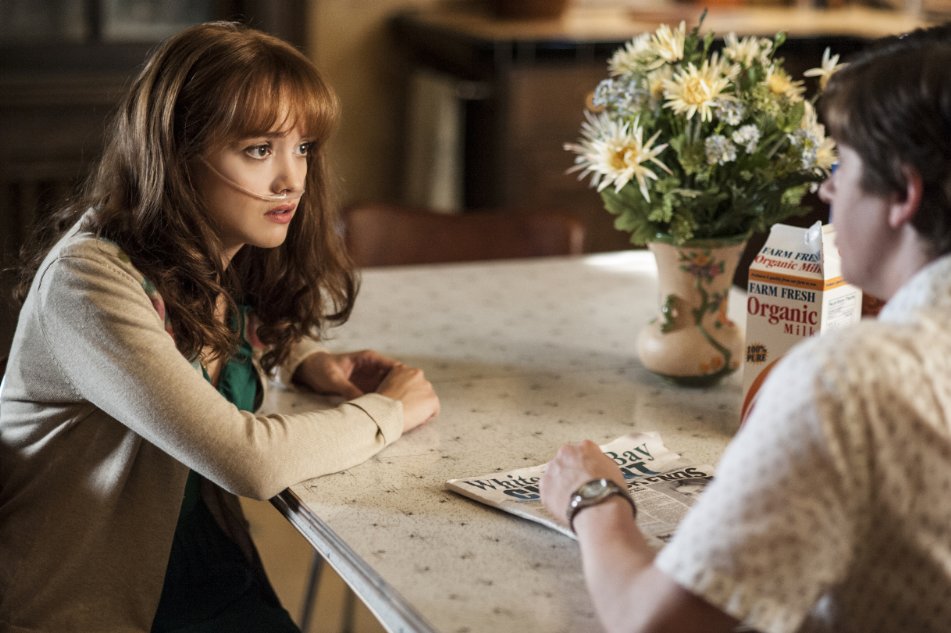Bates Motel, Season 2: Episode 4 – “Check-Out”
Written by Liz Tigelaar
Directed by John David Coles
Airs Monday nights at 10 on A&E
There’s a sequence in “Check-Out,” when Dylan returns home, that’s shot at a tilted angle near the upstairs landing. This is a rather overt way of visually expressing how incongruous the family dynamic is now that Caleb has shown up and disrupted everything. But it works well because it’s accompanied by Norma and Norman alternating primary positions as they step forward and toward Dylan during the argument/conversation, each growing in stature and looking more powerful as they inch closer to the estranged older son. The family bonds in “Check-Out” are very much at the forefront, and while it still feels like the stories that Norman is being given are not all that interesting compared to some of the other things going on in Bates Motel, this episode at least challenges his mental state more than any other before.
The lines are no longer blurred in that scene; Norman fully transitions into Norma’s state of mind through some kind of transference. If it isn’t all that believable (and I really don’t think it is), it still makes for good popcorn television. The frustrating part, though, is how we’re toyed with in terms of our knowledge and sympathies. There’s a lot of “Caleb said this” and “Norma said that” buzzing around in Dylan’s head as he’s trying to make sense of things, and because we can’t really trust any of the characters at this point, we as audience members are also confused and in limbo regarding what’s factual and what’s bullshit. So, when Norman goes full Norma and Caleb’s life is at risk, the tension and investment that ought to be there is somewhat lessened because of how sloppily the “fault” of the Bates family history is handled. On a superficial level, it seems like sympathies should lie with Caleb, who appears willing to put that difficult past behind him and re-establish some kind of connection with his kin, giving back the money Dylan gave him as a gesture of good faith. If that winds up being elaborate manipulation, that deprives Bates Motel of something it is mostly lacking: characters who are capable of being nice in an uncomplicated way.
The one person that might fit that bill is Emma, who has what is probably my favorite story of “Check-Out,” even though it’s not all that important to the episode or Bates Motel in general. That could just be Olivia Cooke, who remains so dependable in the role and who makes it impossible not to root for her as she awkwardly steps up to the motel room door of the guy she may or may not have lost her virginity to. Whether it’s ducking behind desks or failing horribly to contain her smile, Emma is a beacon of narrative clarity in a story that sometimes feels like it’s utterly confused about where to go next.
It’s somewhat ironic that Katy Perry’s “Roar” is the song playing while Norman and Emma are in the front office. Try as they might, none of these characters follows the example KP sets in that song’s lyrics, which are all about individual strength in the face of adversity. Norman is afraid to “roar,” as it were, knowing that he might lose total control in his confrontation with Caleb. And Norma isn’t much better off, coming up with excuses to get out of hanging with her new White Pine Bay friends and dealing with her brother. That strength is almost entirely repressed in “Check-Out,” where even Jodi, who has that strong air about her, isn’t able to help control Norman. Jodi, unfortunately, is very much the opposite of Emma for me at the moment, and I can’t tell if it’s the writing or the performance–but I’m mostly waiting for her to no longer be on the screen when she is (and this could also partially be because Norman is still a fish out of water in these early episodes, perhaps because of Bradley’s departure).
While Emma can carry a semi-unrelated thread of her own in “Check-Out,” Sheriff Romero doesn’t fare all that well as he gets wrapped up in laying down some intimidation only to see his house burning. The first season of Bates Motel is not a great example of a series that is capable of making its secondary characters and setting work on their own. The drug and slave plots from last year stand out like sore thumbs, and Romero’s scenes here follow in line with that because of how superfluous they are in an episode that otherwise has to do with family. It would be nice, of course, if the town could have an interesting life of its own in Bates Motel, but it’s an area of the series that definitely needs a lot of careful attention and work.
As we drift further into the Bates family connections, I’m wondering when the mother-son relationship between Norma and Norman will take the spotlight it did for a good portion of last season. Amid all the scenes with Dylan and Caleb, there’s a sequence that’s initially shot from above Norma and Norman as they’re lying on her bed. When the camera drops down to look at Norman hold her from behind and lean into her more like a comforting lover than a son, those weird and murky incestual undertones crop back up, giving Bates Motel what I think is its natural tone. It’s strange to say that I want more of that, but it’s what makes the series work at its best.
– Sean Colletti


